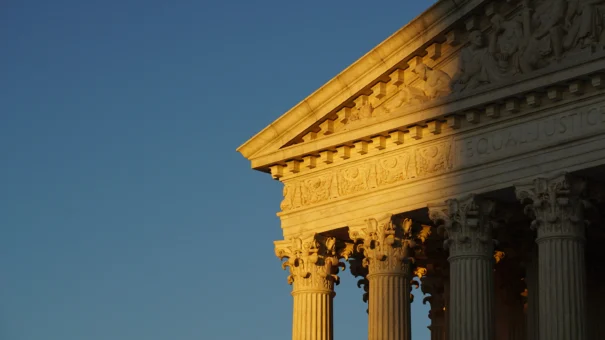
Photo by Ian Hutchinson
Georgetown Law’s O’Neill Institute for National and Global Health Law hosted an event, sponsored by Ms and Feminist Majority Foundation, on July 1st reviewing the Supreme Court’s 2024 term and discussing the current crisis of health and democracy due to the Dobbs decision.
In honor of the 70th anniversary of Brown v. Board of Education, the event opened with a conversation on the state of civil rights today. Georgetown Dean William H. Treanor and Janai Nelson, President and Director-Counsel of the NAACP Legal Defense Fund, joined Ms Magazine’s own Michele Bratcher Goodwin for the discussion. The speakers emphasized that we cannot take for granted the previous Supreme Court decisions that created a more equal society, warning that the current court is on track to reverse as many as possible and has already effectively overturned Affirmative Action. They stressed the ongoing importance of fighting for civil rights, especially as the United States approaches a demographic shift where it will no longer have a majority white population.
The discussion shifted to focus on the health and legal crises post-Dobbs. In June 2022, the Supreme Court ruled on the landmark case, Dobbs v. Jackson Women’s Health Organization, overturning the constitutional right to access abortion that had been in place for nearly half a century due to Roe v. Wade. Since the decision, abortion laws and policies have been left to the states, resulting in many states banning or heavily restricting access.
Panelists examined the negative health implications of these restrictions on patients and healthcare providers, from immediate concerns for safe reproductive healthcare to the criminalization of patients and providers. They also explored two recent Supreme Court abortion cases: FDA v. Alliance for Hippocratic Medicine and Moyle v. United States. The FDA case involved access to the abortion pills, mifepristone and misoprostol, with the Supreme Court ruling that the plaintiffs had no standing, keeping mifepristone accessible. The Moyle case, challenging the EMTALA law’s requirement for hospitals to provide necessary stabilizing treatment in emergencies, including abortions, was sent back to lower courts for further proceedings. The discussion highlighted the broad, intersectional impacts of the anti-abortion movement, which affects not only women but also racial minorities and transgender individuals.
The event concluded with a sobering discussion on maternal mortality. The panelists shared personal experiences and discussed the alarming rise in maternal mortality rates post-Dobbs. They highlighted how restrictive abortion laws have led to inadequate care for pregnancy-related emergencies, with states like Texas prohibiting abortions even when the baby will not survive. The lack of access to reproductive healthcare is forcing women to travel out of state or avoid travel while pregnant. The panel emphasized that minority mothers are dying at higher rates, framing the issue as a critical civil rights concern. With 83% of maternal mortality deaths being preventable, urgent action is needed to address this crisis.
